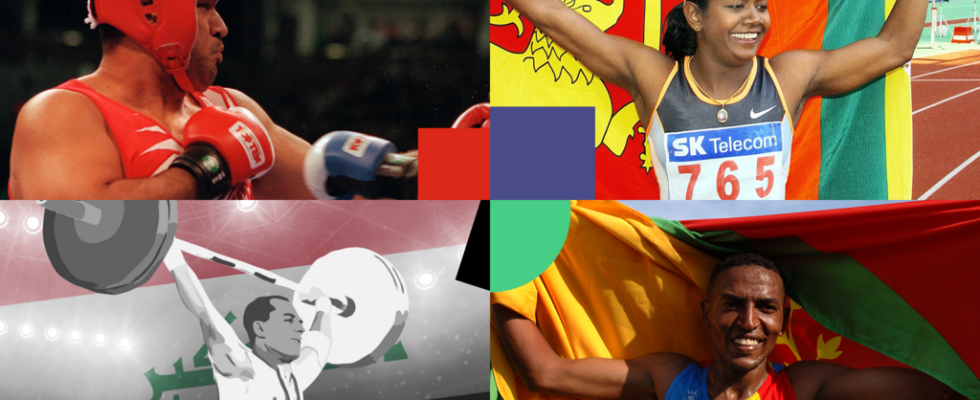As the Paris 2024 Olympic Games approach, RFI looks back at these medalists who shed light on their countries that are not used to monopolizing the podiums. Today, focus on the Tongan Paea Wolfgramm, the Sri Lankan Susanthika Jayasinghe, the Eritrean Zersenay Tadesse and the Iraqi Abdul Wahid Aziz.
4 min
Paea Wolfgramm, the Tongan with silver gloves in Atlanta
Coming from the Tonga Islands, a state with a population of 100,000, Paea Wolfgramm began his journey in rugby, the kingdom’s king sport. It wasn’t until 1990, at the age of 21, that he decided to try boxing. With his impressive physique – 140 kilos – the Tongan distinguished himself as an amateur among heavyweights and managed to qualify for the 1996 Olympic Games. In Atlanta, he arrived as an outsider, but was going to surprise everyone. As soon as he entered the fray, he narrowly defeated the promising Belarusian Sergei Liakhovich. It was then the Cuban Alexis Rubalcaba who was defeated. In the semi-final, Paea Wolfgramm dominated Nigeria’s Duncan Dokiwari, securing Tonga their first Olympic medal. But in the final, he could do nothing against the Ukrainian Wladimir Klitschko and had to settle for silver. Having turned professional, Wolfgramm won 18 of his first 19 fights, but failed again against Klitschko in 2000, during a clash for the WBC belt. The Tongan will again lose for the IBO belt against the Cuban Eliecer Castillo and will retire in 2001.
Susanthika Jayasinghe, the sprinter from Sri Lanka
A first for Sri Lanka and for all of Asia. It is an understatement to say that Susanthika Jayasinghe left her mark on the 2000 Olympics. The sprinter from the poor suburbs of Colombo wrote history on the Sydney track. Years before the Australian meeting, the Sri Lankan had joined her country’s army to be able to persevere in athletics and benefit from good preparation conditions abroad. Winning bet in 1997 with a title of vice-world champion in the 200m. At the 2000 Olympics, Susanthika Jayasinghe confirmed her great potential: she finished third over the same distance, becoming the first Sri Lankan Olympic champion, 52 years after her compatriot Duncan White in the 400m hurdles. She is also the first Asian woman on the podium in a sprint event at the Olympics. Better yet: downgraded in 2007 after her confession to doping, the American Marion Jones lost her Olympic medals. And thus, Susanthika Jayasinghe collects a silver medal.
Zersenay Tadesse, the runner who carried Eritrea in 2004
It’s the story of a young man who dreamed of being a cyclist and ultimately found himself a runner. Born in 1982, Zersenay Tadesse saw himself well on the Tour de France. It had potential over distances of less than 50 kilometers in any case. Promising certainly, but not enough for the pro circuit. However, the Eritrean attracted some attention. “ My success in cycling made athletics officials think that I might have a good chest, and so they invited me for a race “, he told the Olympics website. And that’s how the young man threw himself into long-distance running in 2002. And two years later, during the 2004 Olympic Games in Athens, Zersenay Tadesse gave Eritrea its only Olympic medal at that time. day. Lined up over 10,000 m, the cross-country skier took bronze, behind the Ethiopians Kenenisa Bekele and Sileshi Sihine. Acclaimed in his country for this unexpected result, Zersenay Tadesse declared: “ Every athlete dreams of winning an Olympic medal. I hope now people will know the name Eritrea. »
Abdul Wahid Aziz, from the podium of Rome 1960 to Iraqi jails
Some will see this as an anomaly; Iraq, once a great power in the Middle East, has only a “poor” medal hanging on its Olympic table. The feat was signed by Abdul Wahid Aziz, a weightlifter who won the bronze medal at the 1960 Games in the 67.5 kg category. The Basra native, who lifted a weight of 380 kilos, was ex aequo with Singaporean Tan Howe Liang. And the silver medal came down to the weight of the athletes. Aziz weighed 400 grams more… The one who had also tried football, basketball, volleyball and swimming, certainly had no idea that his bronze medal would become part of the legend of Iraqi sport. But what followed was going to be less beautiful. Less than three years after the Rome Olympics, Abdul Wahid Aziz fell victim to the Iraqi regime after the coup d’état of February 8, 1963, also called the Ramadan revolution. The weightlifter is tortured on suspicion of being a leftist. A year later, he retired from international football following the execution of his coach. In 1980, he was imprisoned by Saddam Hussein’s regime. After a year in detention, he died in July 1982. In 2014, the Iraqi National Olympic Committee announced the creation of the Abdul Wahid Aziz International Weightlifting Championships, in honor of “the greatest national Olympian”.
